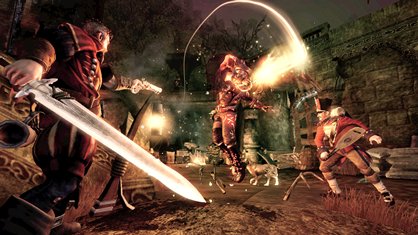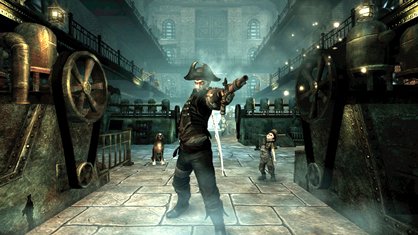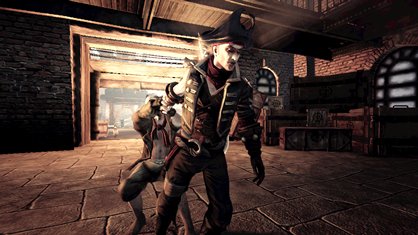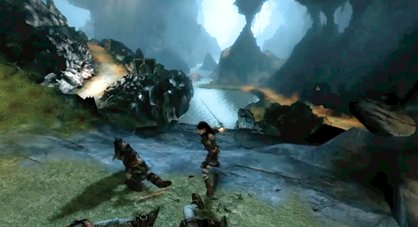Fable III developer interview
We get hyperbolic with Peter Molyneux about removing XP from RPGs
Set in a Dickensian world of top hats, industry, and gaslight, Fable III dumps Fable II’s Expression wheel and even its experience system, replacing them with new mechanics which Peter reckons are ‘real game-changers’. Well, he would, wouldn’t he?

So this is a new Peter Molyneux – still a softly spoken walking quote machine, but these days more measured in his promises. He’s not out to make you feel like God: for Fable III, it’s enough for you to feel like the King.
Around halfway through Fable III you’ll lead a revolt which will see the King overthrown and yourself placed in power. Fable’s new experience system is powered by Followers – the more popular you are with the people, the more powerful you become. Along the way to the throne you’ll make promises to sway those followers, signing guarantees to close workhouses and send children to school; but it’s not easy being King, and keeping those promises might be the death of you.
Fable III will make you choose between what’s right and what’s possible, and every decision will become a literal hands-on choice made by reaching out and touching the world. Fable III’s new ‘Touch’ system lets you take any character by the hand and lead them to safety, danger, or just to the other side of town. You can take a tramp by the hand and lead him to your home for a meal or the workhouse and near-slavery, or lead a child to safety or abandon them right in the middle of nowhere. Every choice is made with your own hands, but if that sounds like it could well be a job for Natal, Peter is keeping quiet. Not that quiet, mind you…
Touch, Peter? Natal, surely?

I am absolutely forbidden to talk about Natal... Only that I’d say it’s a great device for a designer that makes you think in a very, very different way, and that there are unique things in Fable and it would be lovely to marry those two things together, would it not? But that’s not a confession that we have Natal functionality. I can tell you that the primary way to play Fable will be with the controller. I could spend many hours telling you about Natal and Fable...
What mistakes did you make with the first Fables?
Sign up to the GamesRadar+ Newsletter
Weekly digests, tales from the communities you love, and more
I think the first mistake in Fable 1 was that I really mistook the idea of game features as goodness. I didn’t think about the mechanics of those game features or how to explain them to people or how to exploit them in the story.
There was this amazing moment when this piece of research came back – more than half the people that played Fable II understood and used less than half the features of the game. And you think, “oh my God, what a talentless bastard I really am,” because how can I have made a game in which the players understand less than half of its mechanics? It’s like making a film where people are like, “that was cool... I don’t know what the hell was going on, but it was quite cool.”

You know, that seems wrong, so I think Fable III is all about using mechanics, exploiting mechanics, giving gameplay reasons for things. Like Expressions, for example. They were cool in Fable II, but they were really just a way of doing a fart joke over and over again. Let’s be honest about it. That’s what they were. They needed to have an overhaul, and the way you overhaul them is to make them simpler so that more people can use them. Striving for simplicity and accessibility is giving true depth. You want 100 percent of the people to understand 100 percent of the game.
Are you afraid people will think you’ve dumbed the game down?
No. You can design a game around ten percent of your audience if you want to but you’re probably being a bit lazy about it, and you know what? The world moves on, man.
Some people getting really upset if I remove experience and health bars and move leveling from a 2D to a 3D interface isn’t a reason not to do it, it’s actually a reason to do it. I know some people are gonna miss health bars and experience but their total number is getting smaller and smaller.

I like Expressions and I like the ability to emote but there’s just no reason for me to do that, but then you start to introduce the Touch system and the Follower system and you’re like “of course!” Now it fits in, now it’s part of the game, now there’s a reason for me to do that. There’s a consequence to me doing that and it all adds up.


